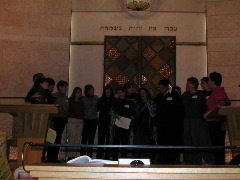My first awareness of the Women’s Rabbinic Network came,
rather appropriately, from one of the first women rabbis that I learned from
and was inspired by while I was still living in the UK. Rabbi Marcia Plumb, originally hailing
from Texas, but living and working in the UK for a number of years, already had
many years of first hand knowledge of the WRN. Since arriving in London, she had also become one of the
founding members of a wonderful feminist Jewish group that ran its own
conferences and workshops, ‘The Half Empty Bookcase.’
And so it was, back in 2002, just as I was starting my
rabbinic studies at Leo Baeck College, that Marcia brought a group of us
together – other female colleagues out in the field and rabbinic students – and
announced that, at the last WRN Convention, she had suggested that they all
come to London for the next one.
And they decided to take her up on the offer! We went to work creating a convention program – a
considerable achievement for a group, only one of whom had ever seen what a WRN
Convention looked like.
Ten years ago, in January, 2003, approximately 80 women
rabbis gathered in London – an incredible bringing-together of women from North
America, Israel, the UK, and several communities across Europe. Now, by this time I had met many, if
not all, of the female rabbis in the UK.
I don’t have the total number that existed then, or now, but if I tell
you that there perhaps 60 or so Progressive synagogues in the UK altogether,
some too small to have their own clergy, you can imagine just how overwhelming
and exciting it was to see 80 women rabbis descend on London at the same time!
Because of my own travels back and forth between the USA and
London, I already knew a handful of these women. It felt wonderful to introduce them to ‘my land’, and they
introduced me to many of their colleagues. Women that I am proud to serve alongside today in the Union for Reform Judaism (URJ); women who taught
at Hebrew Union College (HUC-JIR) who I
would, less than a year later, be learning from when I transferred my studies
to HUC-JIR, New York; women who served as Regional Directors of the movement,
and in other roles as consultants with expertise in a variety of areas; women
who were congregational rabbis, and women whose rabbinate was served in
chaplaincy or in schools. One of
the things that the WRN has done better than many rabbinic associations has
been to embrace and try to support Rabbis who work in many different fields,
recognizing that women in particular are more likely to have a diverse
portfolio that represents their different passions and interests, and sometimes
the choices that have been made or have been necessary to facilitate life-work
balance.
Many of these women became my role models. WRN gatherings, and especially the
unique conventions, became a highlight for me. While these gatherings always include content that
contributes richly to our professional development, there is an added component
of spirituality, creativity and innovation in worship, and encouragement and
support for the real life stuff of being a woman working in the rabbinate, that
I have seldom experienced so authentically and deeply in any other professional
setting.
 |
| Rabbinic shmoozing at WRN London, 2003 |
I know that some of my colleagues are excited about the
possibility of seeing Elvis at Graceland (and yes, we are going to
Graceland!). I’ve never been much
into Elvis, but I am excited about spending the next few days with some of my
female rabbinic colleagues. I know
that I will return ‘All Shook Up’ - re-energized, spiritually nourished, and
inspired.
We will be tweeting
the Convention at #wrn13
We will be
posting blog updates at the WRN Blog, throughout the Convention.


